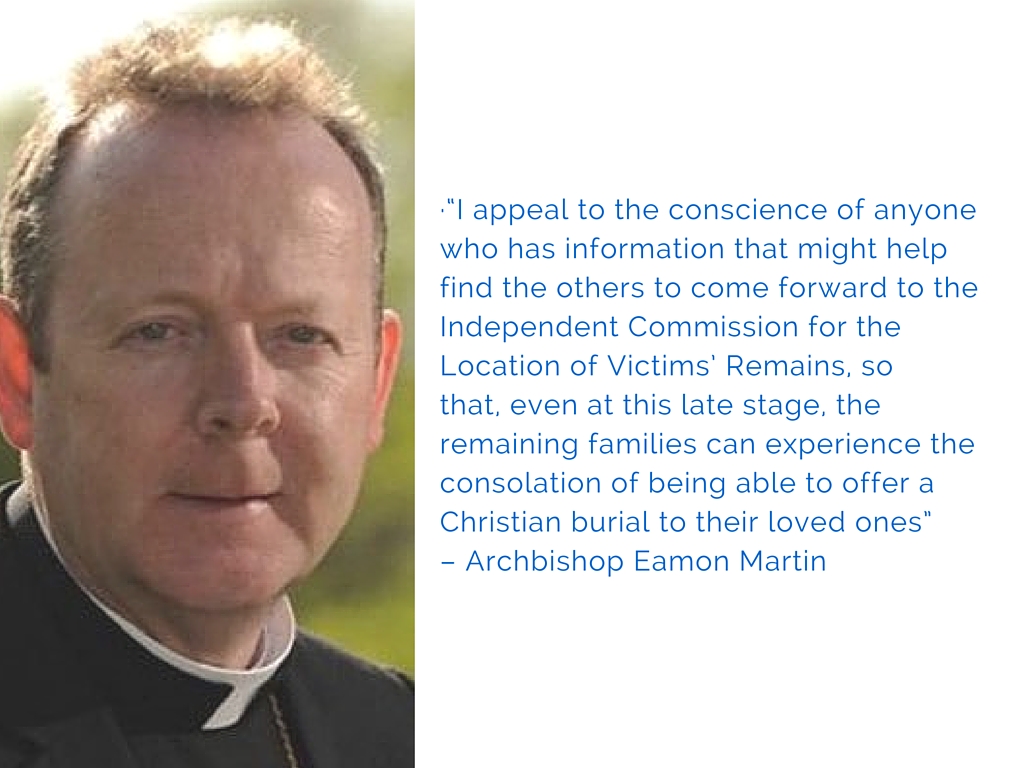Saint Patrick’s College, Armagh
During this Extraordinary Jubilee Year of Mercy, Pope Francis has challenged us to be merciful, as God our Heavenly Father is merciful. Indeed, the theme for the Year of Mercy is ‘merciful like the Father’. We are encouraged during the Year of Mercy to become engaged in the work of mercy, and in particular, to carry out in our daily lives the corporal and spiritual works of mercy. There are seven corporal works of mercy:
To feed the hungry
To give drink to the thirsty
To clothe the naked
To shelter the homeless
To visit the sick
To visit the imprisoned
To bury the dead
I remember once being surprised to find ‘burying the dead’ among the corporal works of mercy. But now I know better. At this Mass last year I became more conscious than ever that to be able to bury our loved ones with dignity and prayer is indeed a work of mercy.
Thank God here in Ireland we have a rich and meaningful tradition of honouring our dead: the wake, the removal, prayers with the family and friends, the Requiem Mass and funeral rites, incensing the coffin and sprinkling the body of our loved one with Holy Water, the simple but dignified burial ceremony at the graveside, prayers (eg a decade of the Rosary) to Mary for those who mourn, a handshake and whispered ‘I’m sorry for your trouble’ to the nearest and dearest. Afterwards many families will prepare memorial prayer cards; there is a strong tradition in Ireland off honouring the place of burial, making regular visits, placing flowers, sharing memories, praying for the dead and for those who mourn, gathering with others on each Cemetery Sunday, having November prayers for the Holy Souls, having the Months Mind and thereafter anniversary Masses.
We do so knowing that praying for the dead, burying the dead and comforting the sorrowful are works of mercy; these are meaningful ways of reaching out to those who need us and letting them know that they are not forgotten.
Funeral rites and traditional customs and rituals are a tremendous comfort to the bereaved, and even though they do not bring our loved ones back, they help us to move emotionally to another space; they are such an important part of the bereavement process which can take many months or years.
The Catechism of the Catholic Church says, `The bodies of the dead must be treated with respect and charity, in faith and hope of the Resurrection. The burial of the dead is a corporal work of mercy; it honours the children of God, who are temples of the Holy Spirit’.
During Holy Week, at the solemn reading of the Passion of our Lord Jesus Christ, we hear about Joseph of Arimathea who after the Crucifixion asked for the body of Jesus so that he could wrap it in a shroud, anoint it with spices and oil and give Jesus the dignity of a proper burial in a new tomb he had bought for himself. A true disciple. A real work of mercy.
This annual Mass for the Disappeared here in Saint Patrick’s College is a work of mercy. By our presence and our prayers we offer compassion and solidarity to those who continue to relive the shock and trauma of their loved one’s disappearance. Over the past seventeen years the families of those abducted, murdered and secretly buried have gathered to comfort one another and a close bond of empathy has developed among them. It is particularly merciful that many of those who have already had the comfort of bringing home for burial the bodies of their loved ones, continue to gathered in support of the remaining families who still wait in hope.
The recovery and dignified laying to rest of Kevin McKee and Seamus Wright since our gathering last Holy Week encourages us to continue to pray and not lose hope. Once more I appeal to the conscience of anyone who has information that might help find the others, to come forward to the Independent Commission for the Location of Victims’ Remains, so that, even at this late stage, the remaining families can experience the consolation of being able to offer a Christian burial to their loved ones. They come with the assurance that the information can only be used to recover the bodies of those disappeared.
And they come during this Jubilee Year of Mercy knowing that helping to bury the dead is a corporal work of mercy for all concerned.
ENDS


